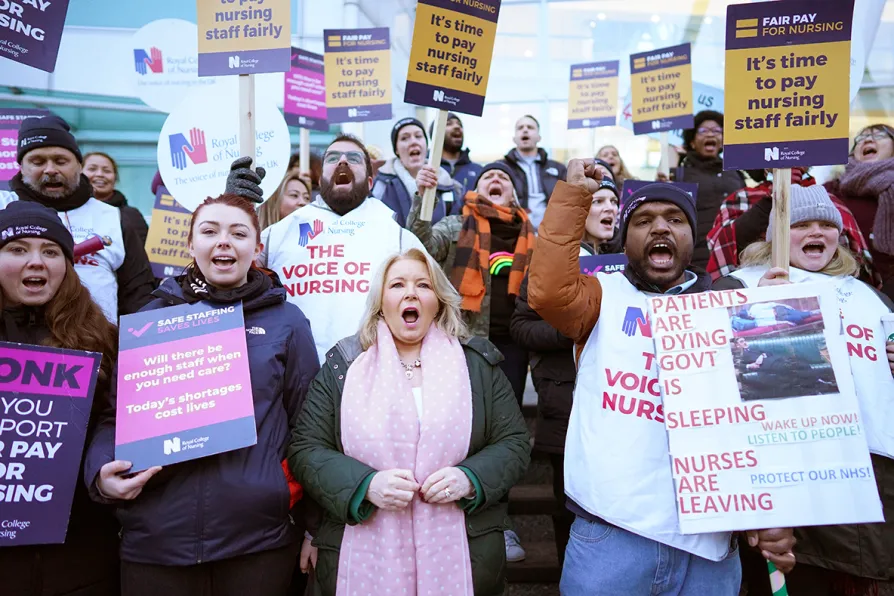
 Royal College of Nursing (RCN) chief executive Pat Cullen joins RCN members on the picket line outside University College Hospital, London, January 19, 2023
Royal College of Nursing (RCN) chief executive Pat Cullen joins RCN members on the picket line outside University College Hospital, London, January 19, 2023
A NHS “workforce crisis” has emerged as the service is unable to recruit enough staff to keep up with soaring demand for care, a major health think tank warned today.
The King’s Fund said workforce growth has both failed to keep up with the rising demand and not been evenly spread among staff groups.
Nursing leaders said staff are burning out as more than a quarter of staff absences in September last year were linked to stress, anxiety and depression.
Ministers have faced renewed calls to tackle the NHS’s chronic lack of staff after figures this week revealed that the bill for hiring temporary front-line workers has soared to more than £10 billion a year.
The Royal College of Nursing said the levels of agency spending were “staggering,” with 42,306 vacant nursing posts in the NHS in England alone.
The news came as consultants in England have voted narrowly against an offer aimed at resolving a long pay dispute with the Government. The British Medical Association said its members rejected the offer by 51.1 per cent.
The BMA’s consultants committee said it had rejected the offer in light of the ballot result, but was giving the Government an opportunity to improve it to a point that may be acceptable to members.
King’s Fund’s director of policy Sally Warren welcomed a 5.7 per cent annual increase to full time equivalent NHS staff in England to 1,321,496 in October 2023 but warned: “While the recent increases are welcome, growth in the workforce has not been evenly spread across staff groups in the NHS.
“For example, an increase in the number of nurses has been evident in acute hospital settings but has declined in learning disability services and community services.
“Additionally, overall growth of the workforce has not kept pace with demand for services, which is increasing at an even faster rate.”
The data showed anxiety, stress, depression and other psychiatric illnesses were the most reported reason for sickness last September.
This accounted for more than 549,300 “full time equivalent days lost” and 26.4 per cent of all sickness absence that month.
“Sickness absence data, also released today, shows the leading reason for staff absence is anxiety or stress with over 26 per cent citing this as the cause of sickness absence in September,” continued Ms Warren. “This workforce crisis has a direct impact on the timeliness and quality of care people receive.
“Beyond the numbers, the NHS workforce is also encumbered with low staff satisfaction, ongoing industrial action, and many staff leaving the NHS due to poor work-life balance.
“The government can help resolve these issues by making careers in health and care more attractive and deliver on its ambitions set out in the NHS Long Term Workforce Plan.
“This means strengthening efforts to drive up recruitment, such as through increasing training and education, but also to take bolder action to improve retention.”
The King’s Fund added that the government is not meeting its 2019 manifesto commitment for 6,000 more GPs, as there were some 37,318 working in the NHS in England last December — only 632 more than a year earlier.
Royal College of Nursing director for England Patricia Marquis said: “Nursing and care staff are burning out — with high rates of depression, stress, and anxiety.
“Staff sickness has shown little sign of improvement over the last decade — today a staggering twice as many are grappling with mental health issues than calling in sick due to cold or flu.
“It’s a dangerous cycle — understaffed wards put increasing pressure on hard-pressed nurses, who are in turn more likely to get sick, creating more gaps in the rota.
“The government has normalised unsafe working conditions in England’s NHS, and put patient care at risk.”
Keep Our NHS Public co-chairman Dr Tony O’Sullivan told the Morning Star: “Behind the government’s complacent claims of ‘more staff than ever’ is a dangerous reality.
“Staffing levels that fall short of what is needed, failure to retain experienced staff, who are leaving in their thousands, broken promises in primary care where there are 1,881 fewer GPs in December than in 2015, a huge turnover of NHS staff (169,000 left in 2022) and widespread demoralisation reflected in anxiety and depression.”
Health minister Andrew Stephenson said the NHS’s Long-Term Workforce Plan will “continue to build on this progress and double the number of adult nurse training and medical school places by 2031.”














